Ho Chi Minh did not get to meet Louis E. Lomax this side of the grass. Harrison Salisbury was in Ha Noi that week.
He had covered the Red Army in their war with Berlin then served the New York Times from Moscow. Harrison and Ho had a lot to talk about.
Time well spent for both men. Harrison came back and started telling the world from New York City that the United States of America was out their fucking mind about bombing the Democratic Republic of Viet Nam.
He was not an immigrant Jew like Noam Chomsky. He was a Yankee whose patriline arrived from Wales to the Massachusetts Bay colony, stayed for 2 more generations and moved over to Rhode Island for 3.
Then his grandfather was born on the New York frontier with the lakes trading west. His father was born in Wisconsin, 1 new state of the old Northwest, then married into another, Minnesota, where Harrison was born.
All those ancestors served as responsible men in the clans who have settled this country. Harrison was not only a Boy Scout of America but an Eagle Scout.
He was publishing in the New York Times as he had started to do in the previous war for the world. Harrison, like Noam before him, was the establishment of the USA stepping back from a rounding error in the containment of the Union of Soviet Socialist Republics.
The Pentagon was writing the same thing and more at the same time in their papers on the war, in secret while the White House railed in public against Harrison. He was a great servant to our nation.
But Uncle would have had more fun with Br’er Louis. They had more in common as gentlemen of color.
Well not gentlemen. Gentlemen were their enemies.
Ho spent 35 years as a fugitive from the justice of gentlemen. Louis started his adult life as a convict in their prison.
[Every fact about Louis’ career in this Viet Nam letter comes from historian Thomas Aiello’s biography, pictured. Thomas teaches in Louis’ home town.]
Louis did more time than Ho, as a common criminal. They both were revolutionaries who wrote for the newspapers, voluminously.
In contrast to Harrison it is hard to say what either Ho or Louis thought in particular about anything specific. Ho wrote for the liberation of Viet Nam.
Louis wrote for the liberation of black Americans. Everything else was a detail subject to change.
I like to think of the two rascals in the meeting they never had over the holidays in 1966 and 67. Louis had met in June with representatives of the DRVN while he and they had other business in the Swiss Confederation.
In December he announced that he had won permission from both the DRVN and the USA to visit Ha Noi and interview Ho Chi Minh [Aiello, 2021: 134.] Bear in mind that Louis had done time for renting automobiles and selling them to used car dealers [Aiello, 2021: 1.]
Right away he called up Louis Emanuel Martin for a briefing, by the president if possible. That other Louis Emanuel was a foreign correspondent and publisher who served as consigliere from his, and our Louis’ America to the Kennedy then to the Johnson administration.
Our Louis got meetings with the National Security Council and the State Department, including the deputy assistant secretary for East Asian and Pacific affairs, previously the ambassador to Laos [Aiello, 2021: 134-5.] Louis flew back to Los Angeles from Washington, DC, then to Tokyo on Christmas eve, then Bangkok, and on to Phnom Penh to wait for his flight to Ha Noi.
It was cancelled. He got no meetings in Viet Nam [Aiello, 2021: 136.]
Even in my time, starting 20 years later in the reconciliation movement, invitations and visas there were delicate matters, opaque to inspection. 5 years after we lifted the trade embargo in 1994, their government invited me to Ha Noi in black and white in 1999 then turned me back before I got on the plane.
In 1967 Louis had returned from Phnom Penh to Bangkok. He stayed a couple few weeks then flew home still in January and wrote a book about Thailand, titled Thailand, published that same year, 1967 [Aiello, 2021: 139-40.]
That is the way to do it. If you are going to write a book about a country you don’t want to stay as long as a month.
I worked 14 months in 3 trips across 3 consecutive calendar years in Ha Noi, married a woman of the country, have examined documents in 4 of their languages daily over 35 years. I mapped the Vietnamese bookstores and libraries of Paris, France across 9 months at the turn of the century.
I have visited the Vietnamese cities of Westminster, California and Falls Church, Virginia, many times, and represented Vietnamese and ethnic minorities from that country in court here. My former wife is just 1 of dozens of men and women in my head with Vietnamese names or passports.
I read my daily news, not just Vietnamese news, from Vietnamese sources. Yet all I have managed to write about Viet Nam are these brief Viet Nam letters.
In 1967, David Wyatt had been fully employed to study Thailand all that decade, but it was 2 more years to his monograph The Politics of Reform in Thailand. His own analytic, narrative, synthetic Thailand took another 13 years.
I can see David pulling his ectomorphic, skeletal face at Louis’ book, if he noticed. That was a characteristic gesture, pursing lips under those deep wide orbits at anyone not so calm and deliberate and well-born, for instance those Americans who study Viet Nam.
David got along great with Thai royalty and their keepers. Louis’ expatriate guides were a United States Army public information officer, Maynard Parker, and the village anthropologist Michael Moerman [Lomax, 1967: x and 79.]
They spoke to Louis’ interests, national and world security in the rise of minorities. His first book, The Reluctant African (1960) had addressed all the new nations of sub-Saharan Africa from 2 months’ travel [Aiello, 2021: 40-55.]
Officers, a married couple, in a clandestine Central Intelligence Agency station next door to the United Nations were doing the same work at the same time in the same haste [not from Aiello, 2021.] No one knew who the new Africans were.
Louis’ second book The Negro Revolt (1962) and the third, When the Word is Given (1963) spoke from the freedom movement he had covered all his adult career, including the struggle of Black Muslims with the other revolutionaries, and that of Elijah Muhammad with Malcolm X. [Aiello, 2021: 55-72 and 90-110.] Louis knew more about the USA than Africa or Thailand but his contribution was the same in all 3 books.
He enjoyed a grasp of the obvious. The subtitle of his Thailand is the war that is, the war that will be.
We were fighting there when Louis visited. We have never stopped, while we have long since left Viet Nam.
Ha Noi may or may not become our ally against Peking that our first intelligence teams among the Vietnamese recommended. May or may not is Ha Noi’s best bet, there on the border of the central kingdom.
Bangkok by contrast has been our strategic partner all my life. We have consistently supported as well their domestic security against dissent.
I never have heard the likes of David Wyatt say so. Thailand is their iron rice bowl such as Vietnamese studies never has enjoyed.
David didn’t rock that boat. Louis, a bounder, a chancer, a nobody from nowhere rather enjoyed a sense of the contested, of the dialectic, of life.
See the subtitle of Thomas Aiello’s Louis Lomax: the art of deliberate disunity. Those were Louis’ words.
In 1963 he lectured his assembled comrades of the freedom struggle to adopt this art [Aiello, 2021: 1.] While covering the movement, he talked up such as his friend Malcolm the Muslim against such as his Christian friend the Reverend Doctor Martin Luther King, Junior and vice versa [Aiello, 2021: the argument of the biography.]
Louis also called for an activist black minority in both the Democratic and Republican parties. Louis was not prudent, not reliable, not sound, and he didn’t pretend anyone else was.
In his book on Thailand he passed along the undiplomatic confidences of Graham Martin, ambassador from the USA, “‘It all boils down to the fact that we are right and they are wrong. What we want for the world is good, and what the Communists want for the world is bad [Lomax, 1967: 92.]
“‘We have the right to have our missiles pointed at Russia because they are the bad guys; they don’t have the right to have their missiles pointed at us because we are the good guys. The same goes for China: we have the right to be in Thailand because we are good; China doesn’t have the right to be in Cuba because they are bad.
“‘We offer the best hope for Southeast Asia; that is why we are here. That is the way things are and that is the way things are going to be regardless of what we must do to make it that way.
“‘Suppose we have to kill Asians to do it?’ I asked. ‘Then, goddamit, [sic]’ he exploded, ‘we kill Asians!’”
Graham’s patriline appears in the historical record first with his great-grandfather in Stokes County, a few hours from here. A poor white who fathered a poor white son who fathered a poor white grandson.
Great-grandson Graham rose to United States American viceroy at Bangkok through the white-rule Baptist college at Wake Forest then the expanding government of the New Deal. Louis didn’t know his father and the search engine still doesn’t know who that man’s people were.
Lomax is Louis’ matriline. His grandfather the Reverend Thomas A. Lomax appears in the census of 1910, born here in North Carolina the year spent debating whether to secede from the USA.
Graham and Louis were not likely related although their ancestors lived in this same slave state. Few poor whites in Carolina bred human chattel.
But the Southerners spoke the same language. Graham said that stuff because Louis could hear it in sober mien: Graham’s colleagues and subsequent historians have instead read the ambassador as a raving lunatic.
Louis and his comrades, Malcolm and Martin and thousands more, none of them gentlemen of Foggy Bottom, had struggled not only for counter space at Woolworth’s and seats on the bus but chiefly for the right to bring suit, offer testimony, and vote, all in defense of private property. They were born anti-Communists.
Ho missed a rare chance to meet such a militant. Scanning James W. Clinton’s list of about 185 visitors from the USA to the DRVN, 1965-1972, I count 87 arriving through 1969, the year Ho died. [Clinton, 1995: 287-295]
All made strenuous use of the pluralism we protected in resistance to the USSR but the only engaged anti-Communists I have spotted in James’ list are Diane Bevel in 1966 and her comrade Charles Cobb in 1967, both of the Student Nonviolent Coordinating Committee in the movement for private property for black Americans, and the pacifist A.J. Muste in 1967.
Pacifism was a capital offense in the people’s republics and soviets, so A.J. opposed those Communists in charge of any nation. Militant as heck, A.J.’s pacifism opposed passivity, as Martin did from the Birmingham jail.
But Charles and Diane were cubs on their first trip outside the USA, and I don’t think A.J. would have had a wide-ranging conversation with Ho about freedom. A.J. was an on-message kind of guy.
Not Louis. His Thailand careens around that country talking with all kinds of people about all kinds of things, in his art of deliberate disunity.
Ten years later his juniors Benedict Anderson and James C. Scott took up the same work, negotiating the life world of Southeast Asia and the real, royal one of their contemporary David Wyatt. Our man wasn’t here to read them.
Before writing another book Louis rolled a station wagon three times without a seat belt on one of our wide-open Western highways, the year after Uncle expired so quietly his party didn’t tell anyone for a week. I find it pleasant to think of Ho greeting Louis into the country of the dead where at last they could talk.
Of course the DRVN hadn’t let him fly into Ha Noi. You could say that they had no grasp of a black American journalist of freedom, or you could say that they did.
So Louis Lomax went somewhere our country was more consequential and remains so. There he talked with the “Communist who joined me at dinner, the government official who walked with me along the klongs, the Thai intellectual who argued that democracy was only for the educated elite, the mayor of Nakornpanom who called the Bangkok officials “bastards”, the Lao who runs the barbecue-chicken place along Freedom Road, the Phu Thai who come down from the mountain to fish.”
I would have preferred to read about the art of deliberate disunity among Ho and his Vietnamese Communists. But Louis himself wrote in his acknowledgements to Thailand, “Most of all, I want to thank Ho Chi Minh.”
Viet Nam letters respects the property of others under paragraph 107 of United States Code Title 17. If we asked for permission it wouldn’t be criticism. We explain our fair use at length in the letter of September 12, 2022.
The colophon of these Viet Nam letters, directly above, shows the janitor speaking with poet David A. Willson on a Veterans Day.
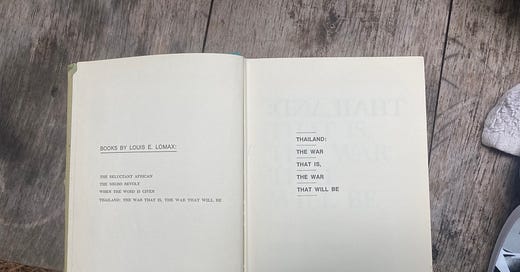



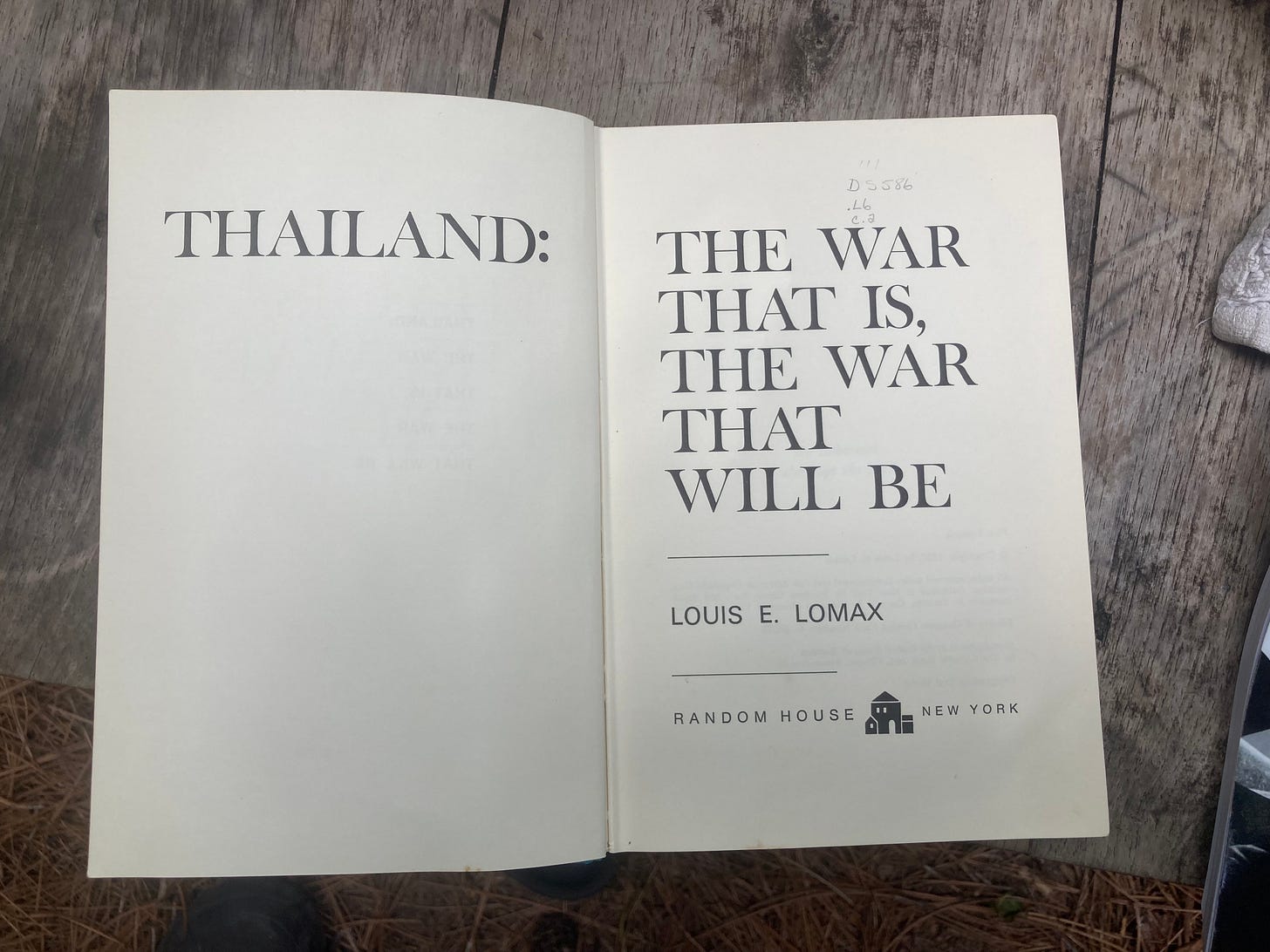
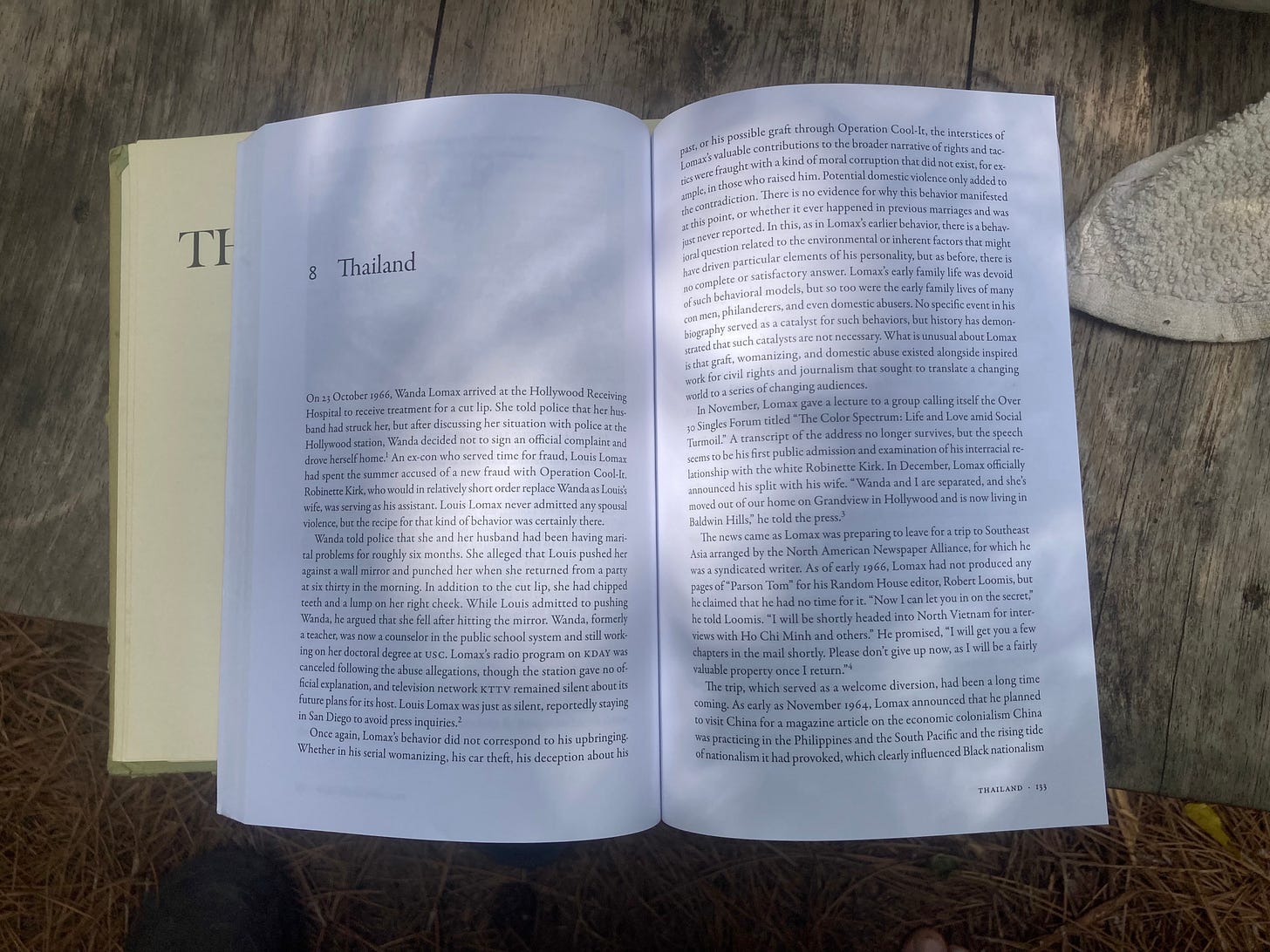
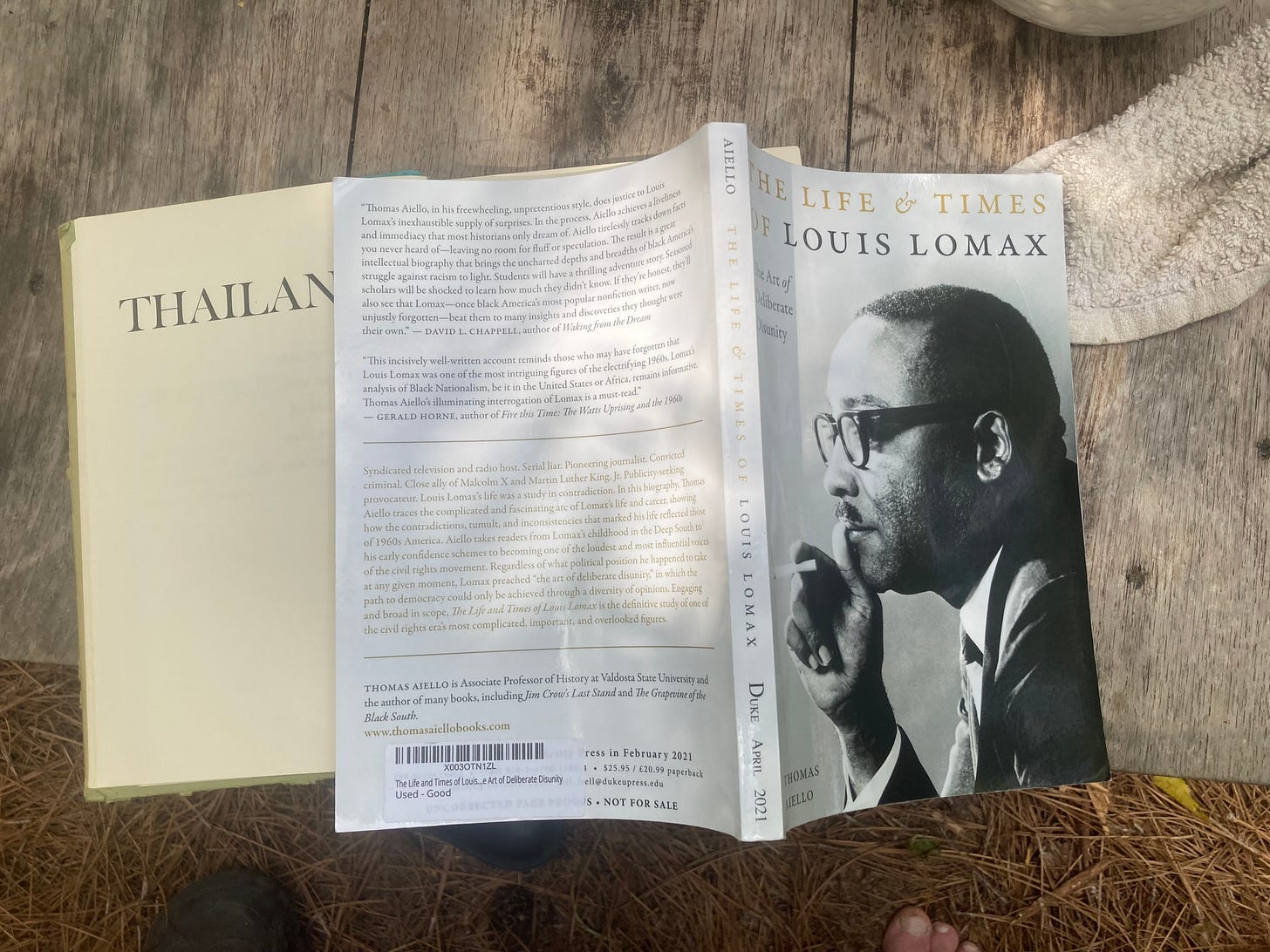
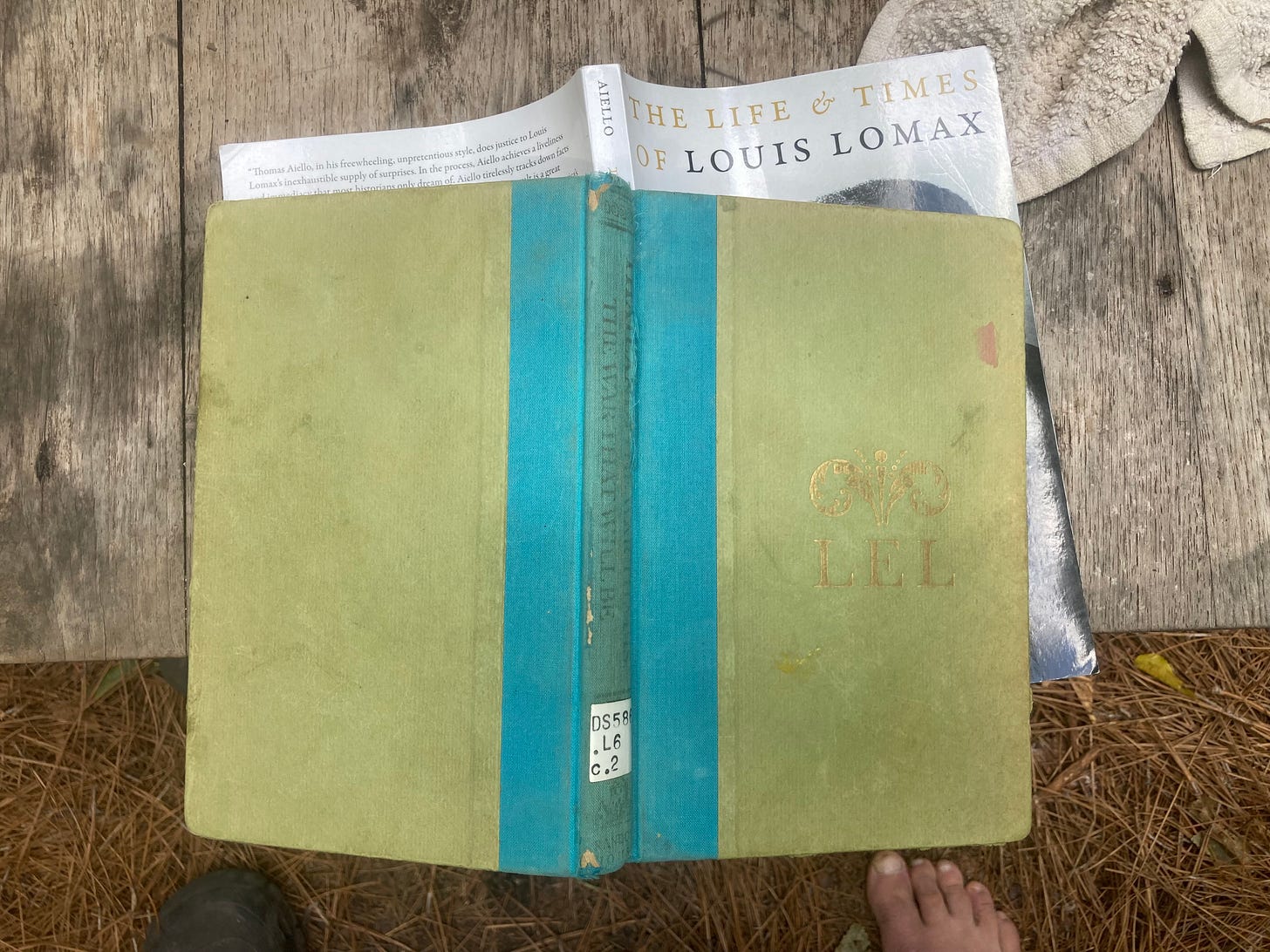

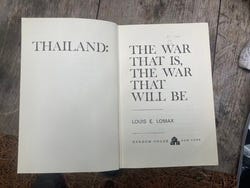
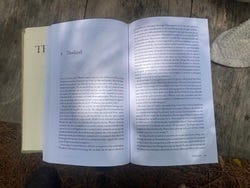
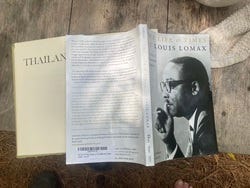
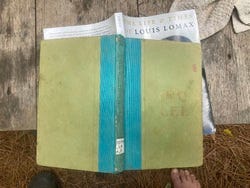
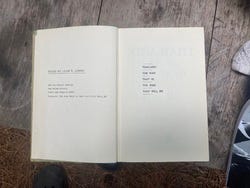
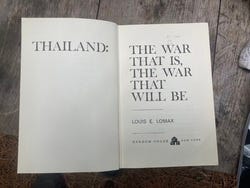
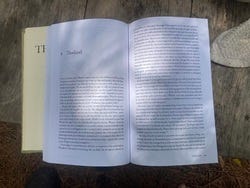

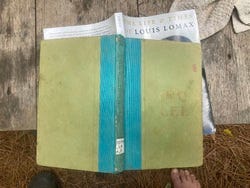
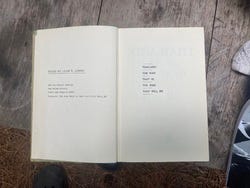
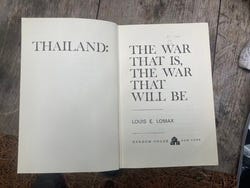





This is gold. Postscript on Harrison: He is infamous for sleeping through the Tiananmen Massacre (a few hundred meters from his Beijing Hotel bed): “It was that gooey kind of sleep….” he wrote. Oh well, we all get old. Doesn’t negate what you describe here.